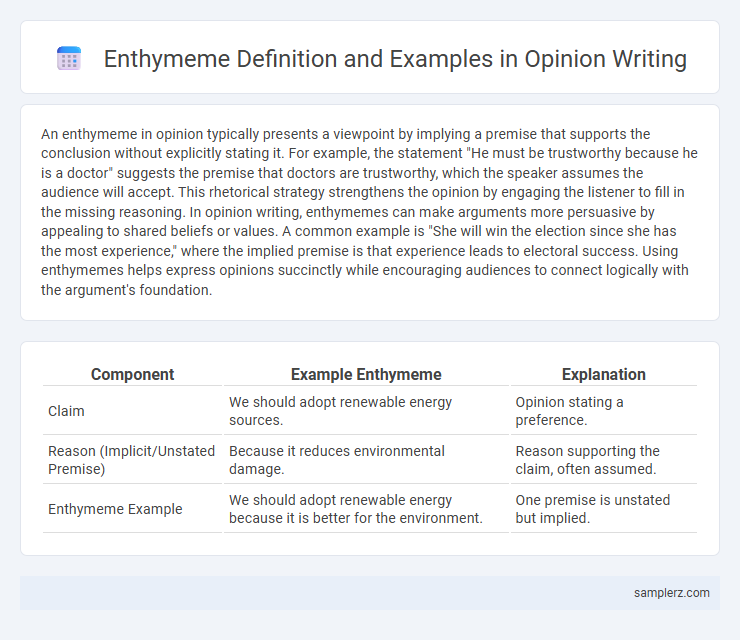An enthymeme in opinion typically presents a viewpoint by implying a premise that supports the conclusion without explicitly stating it. For example, the statement "He must be trustworthy because he is a doctor" suggests the premise that doctors are trustworthy, which the speaker assumes the audience will accept. This rhetorical strategy strengthens the opinion by engaging the listener to fill in the missing reasoning. In opinion writing, enthymemes can make arguments more persuasive by appealing to shared beliefs or values. A common example is "She will win the election since she has the most experience," where the implied premise is that experience leads to electoral success. Using enthymemes helps express opinions succinctly while encouraging audiences to connect logically with the argument's foundation.
Table of Comparison
| Component | Example Enthymeme | Explanation |
|---|---|---|
| Claim | We should adopt renewable energy sources. | Opinion stating a preference. |
| Reason (Implicit/Unstated Premise) | Because it reduces environmental damage. | Reason supporting the claim, often assumed. |
| Enthymeme Example | We should adopt renewable energy because it is better for the environment. | One premise is unstated but implied. |
Understanding Enthymeme: Key Concept in Opinion Writing
Enthymeme in opinion writing functions as a powerful rhetorical device where an argument is presented with an implicit premise, engaging the reader to fill in the gap. This method enhances persuasion by relying on shared knowledge or beliefs between the writer and audience, making opinions more relatable and compelling. Recognizing enthymemes helps readers critically evaluate arguments by identifying underlying assumptions that shape the expressed viewpoint.
Classic Examples of Enthymeme in Editorial Opinions
Classic examples of enthymeme in editorial opinions often rely on unstated premises that the audience is expected to infer, such as "The policy will harm the economy because it restricts trade," where the assumed premise is that restricting trade harms the economy. Editorials frequently use enthymemes to persuade readers by embedding commonly accepted beliefs, reinforcing arguments through implied connections between cause and effect. This rhetorical strategy enhances the impact of opinions by engaging readers' reasoning without explicitly stating every element of the argument.
How Enthymemes Shape Persuasive Opinions
Enthymemes shape persuasive opinions by allowing speakers or writers to implicitly include a premise that resonates with the audience's beliefs, making arguments more relatable and impactful. For example, stating "She must be trustworthy because she always keeps her promises" assumes the accepted premise that keeping promises equates to trustworthiness, engaging the listener's existing knowledge. This technique effectively strengthens persuasion by involving the audience in completing the argument, enhancing agreement and conviction.
Real-World Opinions: Enthymeme Case Studies
Real-world opinions often rely on enthymemes, such as the argument "Good movies make people think," implying that a specific film is good because it provokes thought. Political debates frequently use enthymemes like "Candidate X supports policy Y, so they care about the community," where the hidden premise links policy support to community care. These cases illustrate how enthymemes shape public opinion by relying on shared assumptions to persuade audiences effectively.
Famous Opinion Pieces Using Enthymeme Structure
Famous opinion pieces, such as those by George Orwell and Joan Didion, effectively use the enthymeme structure to persuade readers by presenting an implied premise alongside a clear conclusion. Orwell's essays, like "Politics and the English Language," suggest that poor language diminishes thought quality, encouraging clearer communication without explicitly stating every assumption. This strategic use of enthymemes engages the audience to fill in unstated beliefs, making the argument more compelling and memorable.
Crafting Your Own Opinion with Enthymeme
Crafting your own opinion using an enthymeme involves presenting a claim supported by an implicit premise, making the argument both concise and persuasive. For example, stating "She must be a great leader because her team achieved outstanding results" assumes the unspoken premise that great results indicate strong leadership. This technique engages the audience by prompting them to fill in the missing premise, strengthening the impact of your opinion.
Impact of Enthymeme on Reader Persuasion in Opinions
Enthymemes enhance reader persuasion in opinions by engaging the audience's ability to fill in implied premises, making arguments more interactive and convincing. This rhetorical strategy leverages shared knowledge and beliefs, fostering a sense of agreement and trust between writer and reader. The resulting cognitive involvement strengthens the emotional appeal and commitment to the opinion presented.
Analyzing Political Opinions Through Enthymeme
Analyzing political opinions through enthymeme reveals how implicit premises shape persuasive arguments, such as assuming shared values or beliefs between the speaker and audience. For example, the statement "We must support the new tax law because it benefits hardworking families" relies on the unstated premise that supporting policies favoring hardworking families is inherently good. Understanding these hidden assumptions helps decode political rhetoric and the effectiveness of opinion formation.
Common Fallacies in Opinion Enthymemes
Opinion enthymemes often fall prey to common fallacies such as hasty generalizations, where a broad conclusion is drawn from insufficient evidence. Another frequent issue is the false cause fallacy, linking unrelated events as cause and effect without valid proof. Recognizing these fallacies helps in critically evaluating and constructing more sound and persuasive opinions.
Tips for Identifying Enthymemes in Opinion Articles
Enthymemes commonly appear in opinion articles where authors present incomplete arguments, often omitting an obvious premise assumed by readers. To identify enthymemes, closely examine statements for implied assumptions that connect the claim and evidence, highlighting gaps in explicit reasoning. Recognizing these hidden premises enhances critical evaluation of the argument's validity and persuasive impact.

example of enthymeme in opinion Infographic
 samplerz.com
samplerz.com